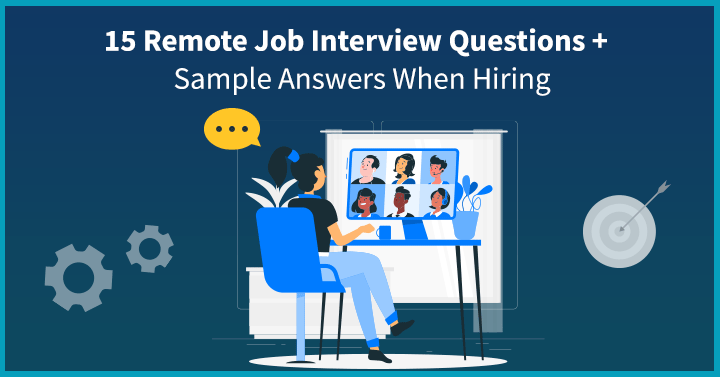As more people migrate from office-based employment to home-based working, the traditional job employment interview is changing. Remote job interview questions may still include such standard queries as a candidate’s long-term goals, but they also need to acknowledge the unique challenges associated with remote working.
We have simplified the process so you can get started. Here are a few sample remote job interview questions and sample answers that can help you make a more informed decision when interviewing a potential hire.
1. Remote Job Interview Questions And Answers

1.1 How many years of remote or home-based work experience do you have?
The reality of what remote working entails is often different from the expectation. Topping the list of questions to ask in a remote job interview should be whether the potential employee already has home-based experience, so you know upfront if they are familiar with the associated challenges.
What to look for in an answer:
There’s a learning curve everyone undergoes when transitioning from office-based employment to home-based employment. The answer to this question should provide a basic idea of where a candidate is on that curve.
Sample answer:
“I’ve previously worked remotely for two companies. Actually, the first company was more hybrid working, where I spent two days in the office a week. I think that helped me to adjust my working patterns more easily.”
1.2 How do you plan to deal with the challenges that come with working remotely?
Managing at-home distractions, loneliness and collaborating with colleagues were the top three challenges that remote workers said they faced in a 2020 study. Someone who has previously worked from home will already be acutely aware of the issues that can arise.
What to look for in an answer:
If the individual is already familiar with remote working, they should be able to describe some techniques and strategies they have developed to combat common problems such as losing focus.
Sample answer:
“I used to find myself getting distracted by household tasks, but I’ve now set up a dedicated workspace that helps me to focus. Having that specific home office area helps me to separate my work life from my home life.”
1.3 When working remotely, what kinds of communication tools have you used?
Having the right mindset is important, but so is having the right technological skills. As part of your remote job interview questions, you will want to find out if the candidate has previously utilized such common communication tools as Zoom, Microsoft Teams, Slack and Monday.
What to look for in an answer:
This is one of the more straightforward remote job interview questions. You’re really just trying to assess a candidate’s current capabilities, as well as making a note of where they may require upskilling if they join the company.
Sample answer:
“I’ve pretty much used all the most common video communication tools, including Skype, Zoom, Microsoft Teams, both for professional and private purposes. I’m less acquainted with Google’s video conferencing services, but given my familiarity with this type of software, I am sure I could learn. At my previous company, I used Slack to stay in touch with colleagues and keep abreast of ongoing projects.”
1.4 What are some ways you keep yourself motivated and engaged while working from home?
Without a line manager or colleagues nearby, it’s incredibly easy to get distracted. Maintaining self-motivation is often one of the most difficult adjustments for a person to make because it’s an almost completely internal process.
What to look for in an answer:
Interview questions for a remote position should seek to assess how well a person can organize and drive themselves since they won’t have a manager in sight overseeing their workflow and generating enthusiasm. A remote employee should have the ability to stimulate themselves to achieve objectives.
Sample answer:
“I used to stay on track with projects by discussing them with other members of the team. I still do that, but instead of leaning over my desk to initiate a conversation, I now use a combination of Slack chat channels and Kanban boards to keep in touch about what we’re all doing.”
1.5 What are some of your likes and dislikes about being in an office?
Interview questions for remote work should delve into why somebody thinks they would be more suited to home-based employment. Is there something specific that they don’t like about being in an office? Are there aspects of working in an office that they might miss? Helping an individual dissect their motivations for wanting remote work will ensure they are making the best choice for them.
What to look for in an answer:
There are certain things that are more common to office work: socializing with colleagues, rapid responses to tech issues, team problem-solving. If these are attributes that a candidate particularly enjoys about being in an office, then remote working might not be the best fit for them. If, on the other hand, what they dislike about being in an office is the constant bustle of a busy workforce, then homeworking might improve their productivity.
Sample answer:
“My last job was in a very busy office where there was a constant stream of people coming and going. It was an open plan, so every time someone went for a meeting or left to see a client, they would catch your eye. While it was nice that it was a buzzy place to work, it was also a bit disruptive and made it more difficult for me to concentrate.”
1.6 What did you do if you had a conflict with a remote coworker?
Conflicts are bound to arise from time to time in any workplace. Remote working adds another layer of complexity because emails and messages can easily be misinterpreted when you don’t have the benefit of in-person social cues. When conflicts do arise, they can be more challenging to resolve when the participants are unable to sit down face-to-face and hash things out.
What to look for in an answer:
Job interview questions for working remotely should assess how proactive candidates are when dealing with crossed wires. In an office environment, there are usually organic opportunities to resolve conflict, such as bumping into one another at lunch. That’s not going to be the case for remote coworkers.
Sample answer:
“I always try to make my emails as neutral and reasoned as possible, to avoid creating a false impression with my remote coworkers. If it is a particularly sensitive or critical issue, or I think someone has taken offense to something I’ve written, I will usually arrange for a quick video call, since I find that visual and vocal cues can easily diffuse any potentially volatile discussion.”
1.7 How would you rate your tech skills on a scale of 1 to 10?
Self-sufficiency is key to many aspects of remote working, even down to solving some minor technical issues. Without tech support in a room nearby, candidates should be able to do some basic level of troubleshooting themselves, or risk losing valuable productivity.
What to look for in an answer:
Hopefully, at least a self-rating of 6 or 7. Remote workers don’t need to be IT experts or technophiles per se, but they should be comfortable naming and discussing several pieces of software they have used in the past, as well as willing to attempt to problem-solve.
Sample answer:
“I would say an 8. I’m familiar with many common tools, including the MS Office suite, Adobe Photoshop and chat programs like Zoom. I’ve also used a variety of content management systems in the past, which always involves a degree of self-learning. I’m fairly patient and methodical when it comes to dealing with IT issues myself.”
1.8 Which project was most challenging for you to design and execute while working from home?
This is a dual question that simultaneously reveals how familiar a person is with the general challenges encountered during a project undertaken by a remote working team, as well as their approach to overcoming those challenges.
What to look for in an answer:
While the home environment may throw up different challenges to the office environment, the crux of questions like this remains the same: the most important thing to note is not how a candidate struggled with a project, but the solutions they came up with to overcome those struggles.
Sample answer:
“I once worked on a time-sensitive project where several different sub-projects had to be completed first, before drawing them all together. Keeping everyone on track and organized was challenging, but we were able to utilize collaborative project visualization software to monitor how each part was progressing and reassign team members to areas that were proving more difficult to execute.”
1.9 How do you plan your workday?
It’s worth stating again: when thinking about how to interview for a remote job, organization is an absolutely crucial consideration. Different individuals may have different approaches to planning out their workday, but what’s important is that there is a method.
What to look for in an answer:
Remote job interview questions should reveal whether a candidate has a clear plan for how to prioritize core work, schedule interviews and block off time for any complex tasks. If the candidate is juggling pets, childcare or other personal matters, this should be accounted for.
Sample answer:
“I try to arrange all my meetings for the morning, so that I can use the afternoon to focus purely on getting down to business. During my lunch break, I take my dog for a walk, which breaks up my day nicely and gets me away from my desk for an hour.”
1.10 Tell me about something you tried and failed at. What did you learn from it?
As with conflicts, there will be failures in any job, but how does the candidate deal with such disappointments? Were they able to draw positive conclusions?
What to look for in an answer:
Behavior-based remote job interview questions and answers are less about concrete skills and more about mental adaptability. Whether the answer concerns remote working strategies that didn’t work or a project that was unsuccessful, the underlying subtext here is to see how flexible and responsive a person is to failure.
Sample answer:
“I once tried to boost productivity in my team by reducing the number of video calls we had each week to just one, encouraging greater reliance on written communication. I found, however, that this had the unintended impact of weakening the spirit of teamwork, leading to more conflicts. We ended up adopting a more flexible approach, scheduling time for tentative video meetings every other day in case there were specific issues to resolve.”
1.11 What are your strategies for maintaining effective communication and collaboration in a distributed team?
Adapting to home-based working is one thing but adapting to home-based working where your colleagues are based in other time zones is quite another. While remote job interview questions like this might not apply to all companies, for those with a global outlook, you will want to know that a candidate has considered the implications.
What to look for in an answer:
It may be that the potential employee has never worked in a distributed team before. This is not necessarily an issue, but they need to be aware that getting answers to questions may be a slower process if the person responding is several hours behind or ahead.
Sample answer:
“I think the key is to clearly segment what tasks I can perform alone and what tasks will need input from others. That way, I don’t get myself stuck in a bottleneck waiting for replies.”
1.12 What activities do you do that help you maintain a work-life balance?
In a traditional workplace, there’s a clear divide between the home and the office, but if your home is your office, the line can become blurred. Being able to switch off is one of the most common problems remote workers encounter.
What to look for in an answer:
Burnout is a serious risk associated with remote working, impacting both the individual’s health and the company’s productivity. You need to check that a potential employee won’t become glued to their desk and knows how to build breaks into their day.
Sample answer:
“It took me a while to get used to not having colleagues who I could have a five-minute chat with over coffee, but after making a few adjustments to my lifestyle, I feel I’ve got a much better work-life balance. During my lunch break, I either meet up with friends who live nearby or go for a jog around the nearby park.”
1.13 What are your goals a year from now?
Just as with an in-office role, remote employees should want to grow with the business. Do the long-term goals of the candidate align with the company’s goals?
What to look for in an answer:
Home-based working can lead to a feeling of disconnection from a company. Remote job interview questions will help you identify whether an interviewee is serious about their professional future or whether they are just looking for a remote role as a stopgap.
Sample answer:
“I hope to become an instrumental part of the team. I am interested in remote working because I want to have a better work-life balance, but I don’t believe that is incongruous with developing my career.”
1.14 Do you have any values that align with the company values?
Whether you’re asking customer service remote job interview questions or software development remote job interview questions, the candidate should match with the company’s values. That could mean a particular emphasis on interpersonal skills or an objective-driven mindset.
What to look for in an answer:
How much does the potential employee know about the business? Why do they think they would be a good fit? A question about values should show the candidate has done their research about the company and has a firm grasp of its ethos.
Sample answer:
“I really admire the company’s approach to innovation. I’m the kind of person who is always looking for ways to optimize solutions and explore new approaches. I think that really aligns with the company’s values around promoting initiative.”
1.15 How do you unwind after work?
It’s easy to become so wrapped up in a project that you continue working on it after office hours are over. While that might not be such a bad thing once in a while, overworking can be extremely detrimental to health in the long term, so it’s important employees demonstrate they have hobbies that take them away from the computer screen.
What to look for in an answer:
As touched on earlier, someone who doesn’t have an outlet outside of work is at risk of burnout. There needs to be a clear understanding that employee wellbeing involves stepping away from the work emails once office hours are over.
Sample answer:
“Remote working means I generally have more time to socialize or exercise before and after work because I spend less time commuting. Since so much of my time is spent in front of a screen, I gravitate towards activities like squash and football, which don’t involve computers.”
2. FAQs

● What are some of the questions to ask while interviewing for a remote job?
Customer service remote job interview questions and accountant remote job interview questions may have unique elements to them, but factors like self-motivation and organization are universal. Some other questions that may be commonly asked are:
- Do you have any remote work experience?
- How do you organize and maintain a schedule?
- How do you prioritize your work?
- How do you feel about consistent communication?
- How do you feel about little to no face-to-face contact?
 Interested in Virtual Team Building Events?
Interested in Virtual Team Building Events?





















